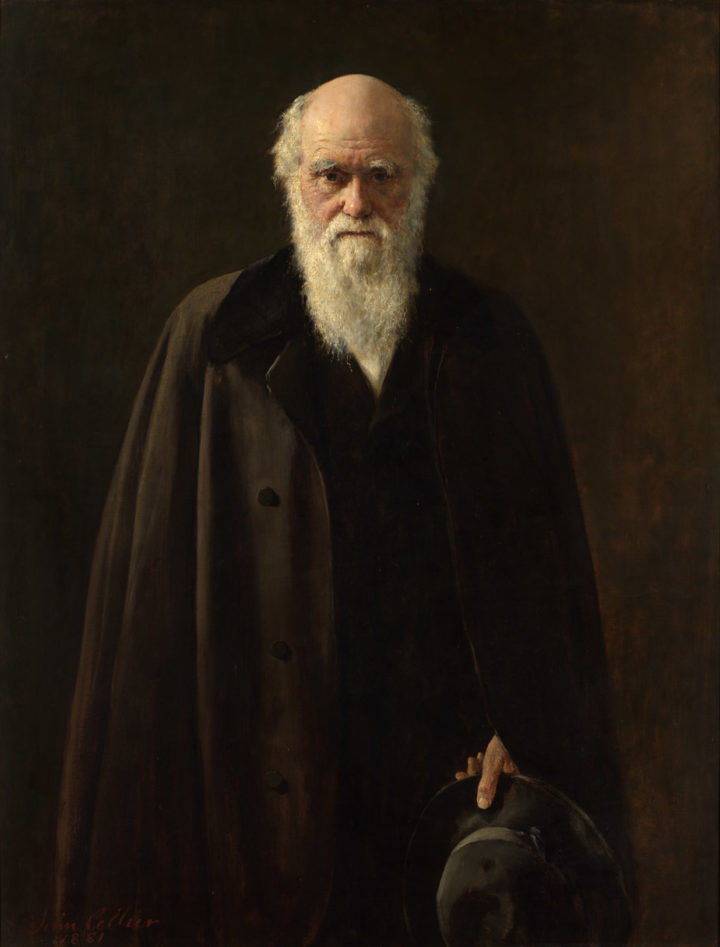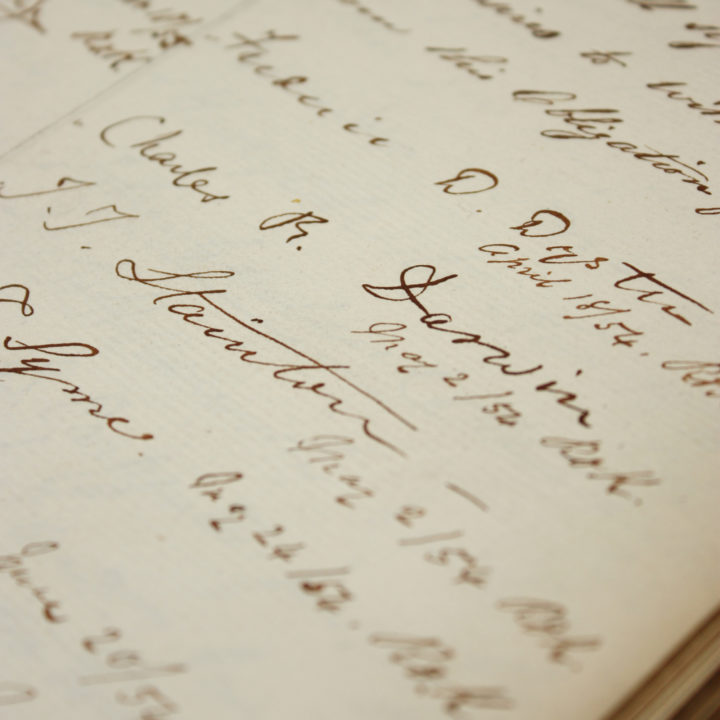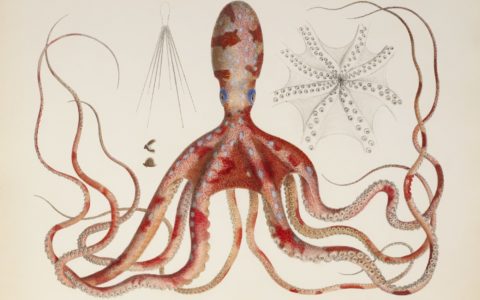Charles Darwin Archive Recognised on Memory of the World Register
Charles Darwin's archive has been recognised on the UNESCO International Memory of the World Register, providing a unique window into the life and work of the influential natural scientist.
Published on 22nd April 2025

The Charles Darwin Archive has been recognised on the prestigious UNESCO International Memory of the World Register, highlighting its critical importance to global science and the necessity of its long-term preservation and accessibility.
The UNESCO Memory of the World Programme serves as the documentary heritage equivalent of UNESCO World Heritage Sites, protecting invaluable records that tell the story of human civilisation.
This inscription marks a significant milestone in recognising Darwin’s legacy, as it brings together materials held by multiple institutions across the UK for the first time, ensuring that his work's scientific, cultural, and historical value is preserved for future generations. The Linnean Society was part of a collaboration with Cambridge University Library, the Natural History Museum, English Heritage’s Down House, the Royal Botanic Gardens, Kew and the National Library of Scotland.
The complete archive, comprising over 20,000 items, includes Darwin’s records illustrating the development of the ground-breaking Darwin-Wallace theory of evolution and his extensive global travels.
Professor Anjali Goswami, President of the Linnean Society, said: "The inscription of Darwin's papers to the UNESCO Memory of the World international register celebrates a man whose ideas were revolutionary, and who undertook the study of nature in a collaborative way: as his papers show, Darwin refined his ideas through continuous correspondence with others.
"We are proud that the Linnean Society was where Darwin's and Wallace's joint theories of evolution were first read. It is an honour to be part of a network of organisations who hold Darwin's written heritage, to care for and share it with future generations."
The UNESCO International Memory of the World Register includes some of the UK’s most treasured documentary heritage, such as the Domesday Book, the Shakespeare Documents, alongside more contemporary materials, including the personal archive of Sir Winston Churchill. The Charles Darwin Archive now joins this esteemed list, underscoring its historical, scientific, and cultural significance.
The inscription of the Charles Darwin Archive comes as part of UNESCO’s latest recognition of 75 archives worldwide onto the International Memory of the World Register.
The Archives

At the Linnean Society, we hold several of Darwin's letters, manuscripts and books, and are also home to John Collier’s original iconic portrait of Charles Darwin, commissioned by the Society and painted in 1883 to commemorate the first reading of the Darwin-Wallace theory of evolution by natural selection at a Linnean Society meeting in 1858.
At Cambridge University Library, the Darwin Archive is a significant collection of Darwin’s books, experimental notes, correspondence, and photographs, representing his scientific and personal activities throughout his life.
The collection in Cambridge includes Darwin’s pocket notebooks recording early statements of key ideas contributing to his theory of evolution, notably that species are not stable. These provide important insights into the development of his thought and feature the iconic ‘Tree of Life’ diagram which he drew on his return from the voyage of the HMS Beagle.
At the Natural History Museum, a letter written to his wife Emma in 1844, provides insight into Darwin’s perceived significance of his species theory research and holds instructions on what she should do in the case of his sudden death. This is alongside other letters to Museum staff and other family members which demonstrate the broad scope of his scientific thinking, research and communication ranging from caterpillars to volcanoes, dahlias to ants and the taking of photographs for his third publication Expression of the Emotions in Man and Animals.
Correspondence with Darwin’s publisher John Murray, held at the National Library of Scotland document the transformation of his research into print, including the ground-breaking On the Origin of Species publication.
At the Royal Botanic Gardens, Kew, documents include a highly significant collection of 44 letters sent around the HMS Beagle expedition from Darwin to Professor John Stevens Henslow, detailing his travels and the genesis of his theory of evolution as he comes in contact with new plants, wildlife and fossils; as well as a rare sketch of the orchid Gavilea patagonica made by Darwin. Other items include a letter from Darwin to his dear friend Joseph Hooker, Director of Kew in which he requests cotton seeds from Kew's collections for his research.
Down House (English Heritage) in Kent was both a family home and a place of work where Darwin pursued his scientific interests, carried out experiments, and researched and wrote his many ground-breaking publications until his death in 1882.
The extensive collection amassed by Darwin during his 40 years at Down paint a picture of Darwin’s professional and personal life and the intersection of the two. The archive here includes over 200 books from Darwin’s personal collection, account books, diaries, the Journal of the Voyage of the Beagle MSS, and Beagle notebooks and letters. More personal items include scrapbooks, Emma Darwin’s photograph album and Charles Darwin’s will. The collection at Down House has been mainly assembled through the generous donations of Darwin’s descendants.

Reactions to the news
Ruth Padel, FRSL, FZS, poet, conservationist, great-great-grand-daughter of Charles Darwin, King’s College London Professor of Poetry Emerita, and author of ‘Tigers in Red Weather’ and ‘Darwin, A Life in Poems’, says: ‘How wonderful to see Darwin’s connections to so many outstanding scientific and cultural institutions in the UK reflected in the recognition of his archive on the UNESCO Memory of the World International Register. All these institutions are open to the public so everyone will have access to his documentary heritage.’
‘He would be so pleased that current and future generations will now be able to draw on these irreplaceable records for their own scientific and cultural creativity. He respected and valued both learned bodies themselves, and the many different contexts and varieties of learning.’
‘‘Everything I thought or read,’ he said, about his own Beagle journey, ‘was made to bear directly on what I had seen and was likely to see. This habit of mind continued during the five years of my voyage. I feel sure it was this training which enabled me to do whatever I have done in science.’’
Dr Jessica Gardner, University Librarian and Director of Library Services at Cambridge University Libraries (CUL) says: "For all Charles Darwin gave the world, we are delighted by the UNESCO recognition in the Memory of the World of the exceptional scientific and heritage significance of his remarkable archive held within eminent UK institutions. Cambridge University Library is home to over 9,000 letters to and from Darwin, as well as his handwritten experimental notebooks, publications, and photographs which have together fostered decades of scholarship and public enjoyment through exhibition, education for schools, and online access.
We could not be prouder of UNESCO’s recognition of this remarkable documentary heritage at the University of Cambridge, where Darwin was a student at Christ’s College and where his family connections run deep across the city, and are reflected in his namesake, Darwin College.”
Dr. Matt Thompson, Conservation, Curatorial and Learning Director at English Heritage, says: “As the guardians of Charles Darwin’s home, Down House, English Heritage warmly welcomes this news. It is the charity’s great privilege to care for a wide range of his archive including a number of his diaries and journals from the Beagle expeditions. All housed within the place where he wrote his great work On the Origin of Species. It’s our pleasure to be part of sharing the memory of Darwin.”
Dr Doug Gurr, Director of the Natural History Museum, London, says: “We are delighted to see Darwin's archive being given such recognition and prominence by UNESCO. As well as a fitting tribute to one of the world's greatest scientists, this is an important acknowledgement of the past, present and future significance of library and archive materials as we continue to transform the study of natural history and tackle the planetary emergency by finding solutions from and for nature.”
Kiri Ross-Jones, Senior Archivist and Records Manager at the Royal Botanic Gardens, Kew, says: "Royal Botanic Gardens, Kew is delighted to be part of this historic collaboration bringing together the libraries and archives that hold such a significant piece of the UK's heritage. The treasures in our archive of over seven million items now have the international recognition they merit, along with the other Darwin collections. We are excited that archives are being placed at the forefront by UNESCO so that people all over the world can now enjoy them as much as we have."
Kirsty McHugh, Curator, John Murray Archive & Publishers’ Collections, National Library of Scotland, says: "Undertaking the publication of On the Origin of Species was a pivotal moment for Charles Darwin and his publisher John Murray. Both took huge reputational risks in putting this research before the public, but it paid off. Archives like these serve as a reminder to us all how life – and the events that make up our lives and legacies – truly can go one way or the other. It is fitting that archives of such significance have been recognised this way by UNESCO."
